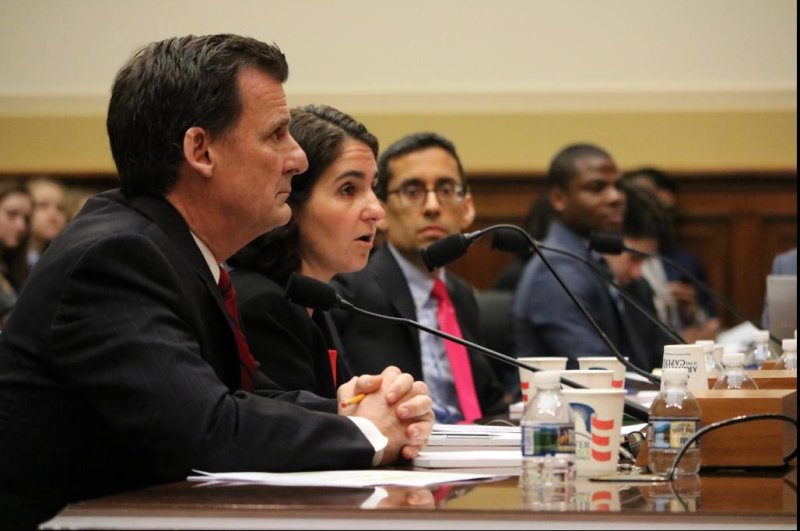From left to right, David Harden, managing director at the Georgetown Strategy Group; Mara Karlin, director of strategic studies at Johns Hopkins University; Jake Sullivan, Vice President Joe Biden's former national security adviser; and Michael Singh, managing director at the Washington Institute for Near East Policy, testify at the House Foreign Affairs Comittee. Photo by Beverly Banks/Medill News Service
WASHINGTON, Feb. 6 (UPI) -- The House Foreign Affairs Committee met Wednesday for a hearing on the Arabian Peninsula, wrangling over the United States' relationship with Saudi Arabia and how to maintain influence in the region.
Chairman Eliot Engel, D-N.Y., said the United States values its relationship with Saudi Arabia but will not tolerate the country's blatant disregard for human rights in its U.S.-supported war in Yemen.
"We cannot look the other way when it comes to the recklessness with which the Saudi-led coalition has conducted its operations," Engel said.
Ranking member Rep. Michael McCaul, R-Texas, agreed with Engel's sentiments and noted how the death of Washington Post columnist Jamal Khashoggi has damaged the U.S.-Saudi relationship. McCaul has been a reliable -- and often vocal -- supporter of President Donald Trump's policy agenda but has opposed the White House's stance on Saudi Arabia since Khashoggi's murder.
"I was both appalled and deeply saddened by the news of Jamal Khashoggi's murder," McCaul said. "Jamal's murder was a major setback in our relationship to Saudi Arabia."
A panel of experts shared their perspectives on how the United States crafts policies to maintain its stronghold in the Middle East, militarily and diplomatically.
David Harden, managing director at the Georgetown Strategy Group, advised lawmakers on how to respond to Yemen's economic collapse.
"If we can get the economics right, then there is a prospect for creating a bit of space to push forward political process and political accommodation," Harden said.
Other lawmakers weighed in on how the United States will proceed with its regional partnership with Saudi Arabia in the future.
Rep. Scott Perry, R-Pa., began a line of questioning directed toward Jake Sullivan, Vice President Joe Biden's former national security adviser, about Saudi Arabia's beheadings for criminal offenses.
When Sullivan did not relay the exact number of crimes citizens are beheaded for in Saudi Arabia, Perry argued that the United States should not abandon its relationship with Saudi Arabia over recent outrage regarding Khashoggi's death.
"Look, what happened to Khashoggi is horrific but the point is this is the Saudi Arabian government and they do this in their government on a regular basis," Perry said.
Rep. Bill Keating, D-Mass., questioned how the United States can be effective when there are conflicting messages coming from members of the Trump administration.
Keating was referring to mixed signals from former Secretary of State Rex Tillerson and Trump about the 2017 Saudi-led blockade of Qatar.
"The president responded, 'Well, that was Tillerson's opinion, I'm with the Saudis,'" Keating said. "How can the U.S. be effective when we are not speaking in one voice?"
Harden said, "We don't actually have enough people on the ground at the Yemen affairs unit to even begin to do any of the analysis that is underlying this and to work through some of the challenges."
Responding to Keating, Mara Karlin, director of strategic studies at Johns Hopkins University, said the United States has great power with its global partnerships.
"When something goes wrong, various countries look to Washington to help figure out what to do," Karlin said. "That's good and I'd rather it be us than Moscow or Beijing."
Rep. Brian Fitzpatrick, R-Pa., asked for the panel's assessment of resources in the Arabian Peninsula region related to cybersecurity aggression.
Michael Singh, managing director at the Washington Institute for Near East Policy, said Iran's cybersecurity threat is growing in addition to advances in maritime and missile technology in the region. Singh also noted how a lack of intelligence resources in the region could lead to further conflict.
"I do worry that especially as we're sort of rebalancing towards Asia, towards the Russia challenge that it is possible we could see shortfall in these resources devoted to these problems," Singh said.















